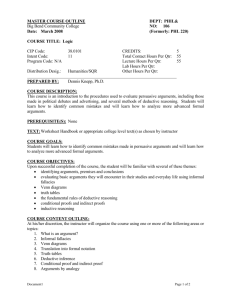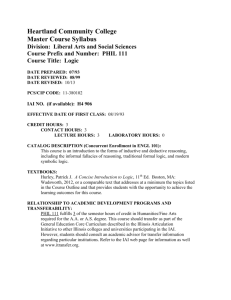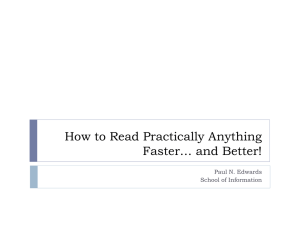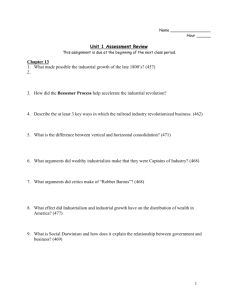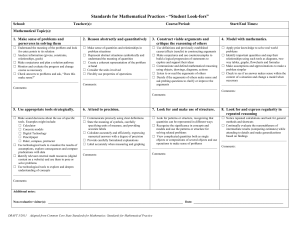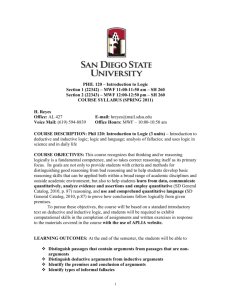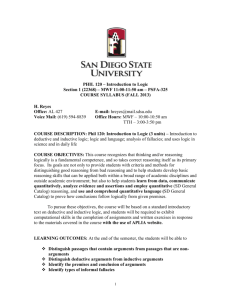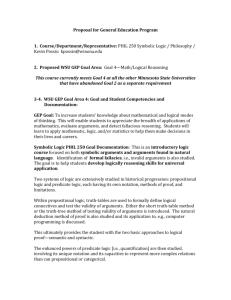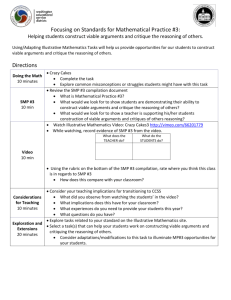Description - Erin C. Tarver
advertisement
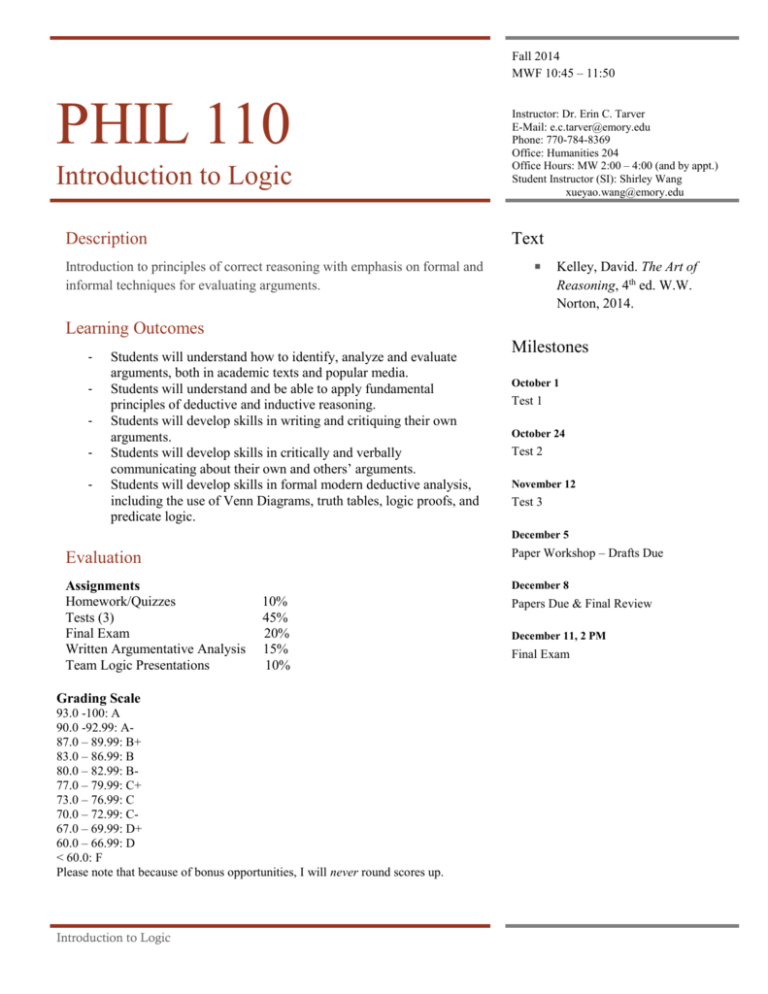
Fall 2014 MWF 10:45 – 11:50 PHIL 110 Introduction to Logic Description Text Introduction to principles of correct reasoning with emphasis on formal and informal techniques for evaluating arguments. Learning Outcomes - Instructor: Dr. Erin C. Tarver E-Mail: e.c.tarver@emory.edu Phone: 770-784-8369 Office: Humanities 204 Office Hours: MW 2:00 – 4:00 (and by appt.) Student Instructor (SI): Shirley Wang xueyao.wang@emory.edu Students will understand how to identify, analyze and evaluate arguments, both in academic texts and popular media. Students will understand and be able to apply fundamental principles of deductive and inductive reasoning. Students will develop skills in writing and critiquing their own arguments. Students will develop skills in critically and verbally communicating about their own and others’ arguments. Students will develop skills in formal modern deductive analysis, including the use of Venn Diagrams, truth tables, logic proofs, and predicate logic. Kelley, David. The Art of Reasoning, 4th ed. W.W. Norton, 2014. Milestones October 1 Test 1 October 24 Test 2 November 12 Test 3 December 5 Paper Workshop – Drafts Due Evaluation Assignments Homework/Quizzes Tests (3) Final Exam Written Argumentative Analysis Team Logic Presentations December 8 10% 45% 20% 15% 10% Grading Scale 93.0 -100: A 90.0 -92.99: A87.0 – 89.99: B+ 83.0 – 86.99: B 80.0 – 82.99: B77.0 – 79.99: C+ 73.0 – 76.99: C 70.0 – 72.99: C67.0 – 69.99: D+ 60.0 – 66.99: D < 60.0: F Please note that because of bonus opportunities, I will never round scores up. Introduction to Logic Papers Due & Final Review December 11, 2 PM Final Exam Assignment Descriptions Homework Exercises and Quizzes You’ll have reading to do prior to each class (see schedule); additionally, you’ll often have written exercises in logic to complete, based on what we learned in the previous meeting. I won’t always collect this work, but will pick it up sporadically throughout the semester—usually without warning. The assignments I pick up may be graded purely on the basis of their completion, or graded for correctness (I will not give you advance notice). I will drop the two lowest homework grades. Nevertheless, I can’t stress strongly enough how important it is for you to do these exercises seriously and consistently. Logic is like working out: a few lucky ones of us can jump in and perform on command, but for the vast majority of folks, without regular, dedicated practice, serious efforts (i.e., tests) will be painful and even disastrous. So, think of this class as P90X for your brain. Be prepared to bring it every day. Note also that you MUST BE IN CLASS ON TIME TO SUBMIT HOMEWORK. I will not take emailed homework, late homework, or homework that you attempt to drop off via a friend or on your own before leaving class. Additionally, there will occasionally be quizzes (see schedule) that will count for a homework grade. Tests There will be 3 tests over the course of the semester. All tests are cumulative of the entire semester. See schedule for dates. Note that I do not schedule make-up tests unless you are absent for an official university event (athletics, debate, etc.) or religious holiday—which you must let me know about within the first two weeks of class—or because of a documented illness. Final Exam The final exam, like all other tests in the course, is cumulative of all semester material. Written Argumentative Analysis One of the most important things you will learn to do in this class is to read and write carefully about your ideas and the ideas of others. This is where you’ll hone those skills. Using short arguments that you make during the first week of class, you’ll analyze and critique your own reasoning in a short paper of 2-3 pages. We will complete this assignment in stages. See schedule for dates. Team Logic Presentations A central part of understanding Logical analysis the ability to recognize and formulate examples of the principles, fallacies, and forms of argument that we encounter in the course. Accordingly, this assignment will require you (in teams) to create and present examples that illustrate the type of argument or principle that we are discussing in class on your assigned date(s). Your goal in this assignment is to collect and present examples that 1) accurately represent the concept being discussed*, and 2) are engaging, novel, or otherwise interesting. You must submit a copy of whatever you present (electronic files are acceptable) to me on the date of your presentation. Your presentation should be concise (approximately 10 minutes), shared by your various team members, and ideally, interactive with the class. You will be graded with reference to the following: - Accuracy/Clarity: How well did your examples illustrate what they were supposed to illustrate? How clear were your explanations of them? - Creativity: How creative/interesting were your examples? How creative was your mode of presentation? - Interactivity: How successful were you at engaging the rest of the class in discussion/analysis of your examples? - Technical features: How involved were the various members of your group? Did your presentation adhere to length guidelines? Did your presentation avoid typos and other technical flaws? * Note that this can be challenging, as you will be presenting/teaching the class about a topic that we are encountering for the first time (hint: look especially at the bolded terms in the reading for that day for guidance on focusing your examples). Although I cannot vet all of your examples in advance, I am happy to meet with you prior to your Team Logic date to discuss any questions you may have about the concept(s) you will be addressing. You must sign up for Team Logic dates by 5 PM on Monday, 9/1. Introduction to Logic Schedule 8/27: What is Logic? 8/29: Arguments and evidence, 1-5, 67 – 71 12/1: Predicate logic proof, 377-381 12/3: Predicate logic proof contd, 382-392 12/5: Paper Workshop: BRING DRAFTS 12/8: REVIEW, PAPERS DUE 9/1: LABOR DAY, No Class 9/3: Diagramming and evaluating arguments, 73-77, 79-80 9/5: Induction and Deduction, 82-86 9/8: Implicit premises and distilling arguments, 88-90, 91-96 9/10: Review: arguments in general 9/12: QUIZ, Introducing Fallacies, 103-109, 111-115 9/15: Fallacies of context, 116-125 9/17: Fallacies of structure, 127-133 9/19: Induction: Generalization, 417-422 9/22: Induction: Causality, 423-430, 431-434 9/24: Induction: Arguments from Analogy, 442-451 9/26: Legal reasoning: HANDOUT 9/29: Induction/Legal reasoning Review 10/1: TEST 1 10/3: Categorical Propositions, 145-154 10/6: Square of Opposition, Venn Diagrams, 155-161 10/8: Immediate inference from categoricals, 163-169, 170-173 10/10: Categorical syllogisms, 179-180, 184-186 10/13: FALL BREAK 10/15: CS Validity: Rules, 187-188, 190-194, 196-197 10/17: : CS Validity: Venn Diagrams, 198-202 10/20: Venn Diagrams, contd., 203-206, 207-211 10/22: Review 10/24: TEST 2 [Proctored] 10/27: Propositional Syllogisms, 219-223, 225-231 10/29: Distilling deductive arguments, 233-240 10/31: Propositional symbolic logic, 260-270 11/3: Truth functions and truth values 271-280, 282-286 11/5: Truth values and statement relations, 282-295 11/7: Truth tables and validity, 300-309 11/10: Review 11/12: TEST 3 11/14: Propositional logic proofs, 311-314, 316-320 11/17: Proofs contd., 322-325, 329-333 11/19: Proofs and rules of equivalence, 335-338 11/21: Predicate logic and statements, 360-365 11/24: Predicate logic statements contd., 366-375 11/26: THANKSGIVING BREAK 11/28: THANKSGIVING BREAK Introduction to Logic FINAL EXAM: Dec 16, 2014 Course Policies Classroom Conduct We’re going to talk quite a bit about arguments in this class—and we’ll definitely have a few of our own!—but that doesn’t mean that we don’t have ground rules. In fact, being respectful of one another, even when we disagree, is absolutely crucial to making this an environment in which everyone can learn. There are several ways we can show one another respect; the following are the ones I insist upon: - We may attack ideas, but never people. Listen to others when they’re talking. Don’t use cell phones or computers in the classroom. Note that I will give ONE warning to put your cell phone or other electronic device away. After this warning, your individual grade for Team Logic will be lowered by two points each time I have to ask you to put your device away. Work on in-class assignments when provided time to do so. Logic is hard. This is not time-filler; I have specifically set aside time for you to practice working collaboratively on the exercises I assign, and to do so with my assistance. Make wise use of this time. DO NOT take it as an invitation to leave early, pack up your things, chat, etc. Persistent violations of the classroom conduct guidelines will result in penalties to your homework grade. Email Policy Please ensure that you are checking your Emory email regularly, as I use it to communicate with you outside of class time. If you have a question you need to ask, CHECK THE SYLLABUS FIRST. If the answer to your question is not contained in the syllabus, please feel free to send me an email. I strive to stay in touch with you outside of class hours, and will generally attempt to answer messages within 24 hours. Please note, however, that I will not answer messages sent the evening before a scheduled test or exam. Finally, I do not discuss grades via email. Please make an appointment to see me if you would like to discuss any course grades. Academic Honesty Academic Honesty is extremely important, and so violations of the Oxford College Honor Code will not be tolerated. I will not hesitate to report any such violations to the Honor Council. Infractions of the Honor Code include plagiarism, cheating, seeking or giving unauthorized assistance, and lying related to academic matters. Further information on Honor Code infractions and procedures are available in the Oxford College Student Handbook, and online: http://oxford.emory.edu/audiences/current_students/Academic/academicsuccess/student-honor-code/index.dot Disability Access I encourage any students with disabilities that may impact their access to or performance in any component of this course to register with Oxford College’s Office of Disability Services, and to let me know about necessary accommodations as soon as possible. The ODS is located in the Student Health/Counseling Center. Additionally, please be aware that my office is located on the second floor of a building without disability access. I will, accordingly, be happy to make arrangements to meet with any student on the first floor of Humanities Hall, should this be necessary. Introduction to Logic
